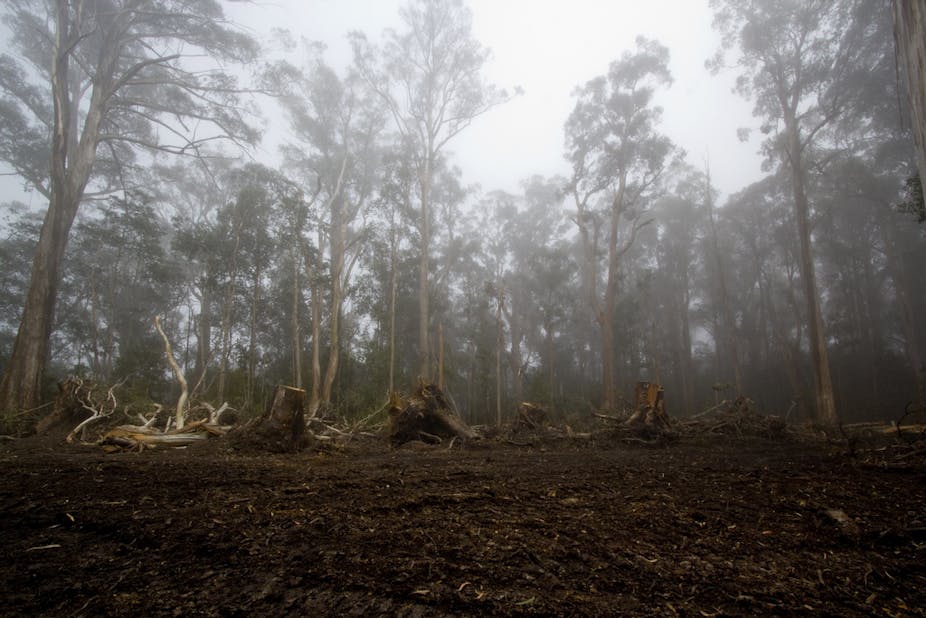At the end of this month, the Victorian Parliament is expected to pass a Bill giving industry long-term control of timber resources in Victoria’s native forests.
The government says the changes are important for the state’s economic prosperity. But the Bill removes important safeguards and regulatory oversight of native forest logging. If enacted, the Bill will leave Victoria’s forests - and the creatures living in them - in a precarious position.
Victoria has some of the most carbon-dense forests in the world. These native forests are home to endangered and protected species like the Leadbeater’s possum.
VicForests, a state-owned timber business, can log state forests with approval from the government. Ownership of native forests is transferred to VicForests before it starts logging and it must abide by certain laws, including a forestry code of practice and the Sustainable Forests (Timber) Act 2004. This Act requires Victoria’s forests to be managed in a way that considers principles of ecologically sustainable development.
What’s changed and why?
The Bill reduces the level of government scrutiny of VicForests’ logging activities, moving to a model of self-regulation. It aims to “deliver clarity, efficiency, security and sustainability to Victoria’s native timber industry” and “reduce the regulatory burden” on VicForests, on the back of a review of the forestry regulations and the state government’s Timber Industry Action Plan.
Even without considering environmental or economic matters, the new regulatory regime for Victoria’s state forests is problematic squarely from a governance perspective.
Long-term forest allocation with minimal government oversight
Allocation orders give VicForests access to certain areas and types of native forest and set the conditions for logging them. There is currently a 15-year limit on allocation orders; the Bill would give VicForests ownership of these forests indefinitely.

There will be no more mandatory five-yearly government review of the orders. And the Bill stops the Minister varying an allocation order where VicForests has sold the timber to a third party. In short, this means that VicForests could enter into contacts that potentially tie up Victoria’s forests for decades.
While the second reading speech included a condition requiring VicForests to seek Ministerial approval to enter into timber supply contracts longer than 20 years, there is nothing in the legislation to this effect.
Self-regulation of logging operations
Before logging in a particular area in the allocated forest (known as a “coupe”), VicForests must prepare a timber release plan saying where and when it will harvest. Currently, it can only start logging if the government is satisfied that the plan is consistent with the allocation order and forestry rules. If the amendments are enacted, VicForests won’t have to get government approval for these plans. According to the second reading speech, it will be up to VicForests’ board of directors to make the assessment themselves.
VicForests is a business enterprise with a singularly commercial objective. It stands to benefit from access to particular logging coupes. If the Bill is passed, VicForests will be in charge of deciding whether it can commence logging and the government will have no power to review and change timber release plans. Under this arrangement VicForests is judge, jury and executioner. Worse still, the Bill removes the five-year limit on the logging operations that can take place under timber release plans.
How should public resources be managed?
Victoria’s native forests are more than a mere timber resource to be exploited. They supply Victoria with fresh, clean water, house threatened and vulnerable species, hold significant economic and environmental value in their carbon stores, and are a source of jobs.
A prudent approach to the governance of this public asset would account for these varied social, economic and environmental interests both now and into the future, and it would be transparent and accountable. Removing the government’s oversight of native forest logging and its power to intervene to protect broader matters of public interest for the sake of securing long-term commercial interests flies in the face of these principles.
The changes to be introduced by the Bill also raise questions about Victoria’s compliance with the Regional Forest Agreements (RFA) that exist between the state and the Commonwealth. RFAs entrust the conservation and sustainable management of a number of Victoria’s forests to the state government, removing Commonwealth involvement in protection of matters of national environmental significance. A condition of the RFAs is that
Neither party will seek to use existing or future legislation to undermine or impede this Agreement.
There has been some opposition to the Bill from the Environment Defenders Office and environment NGOs. John Lenders, Leader of the Opposition in the Legislative Council, has said, “If the board of VicForests is trying to make a profit — and that is part of its obligation — the danger always is, if there are no obligations in such matters, that corners will be cut.” But the Bill has already been passed by the Legislative Council, so will this opposition be enough?
If this Bill is passed by the Legislative Assembly (Lower House), it will cast a shadow on the effective governance of Victoria’s native forests, and have consequences for potentially decades to come.

